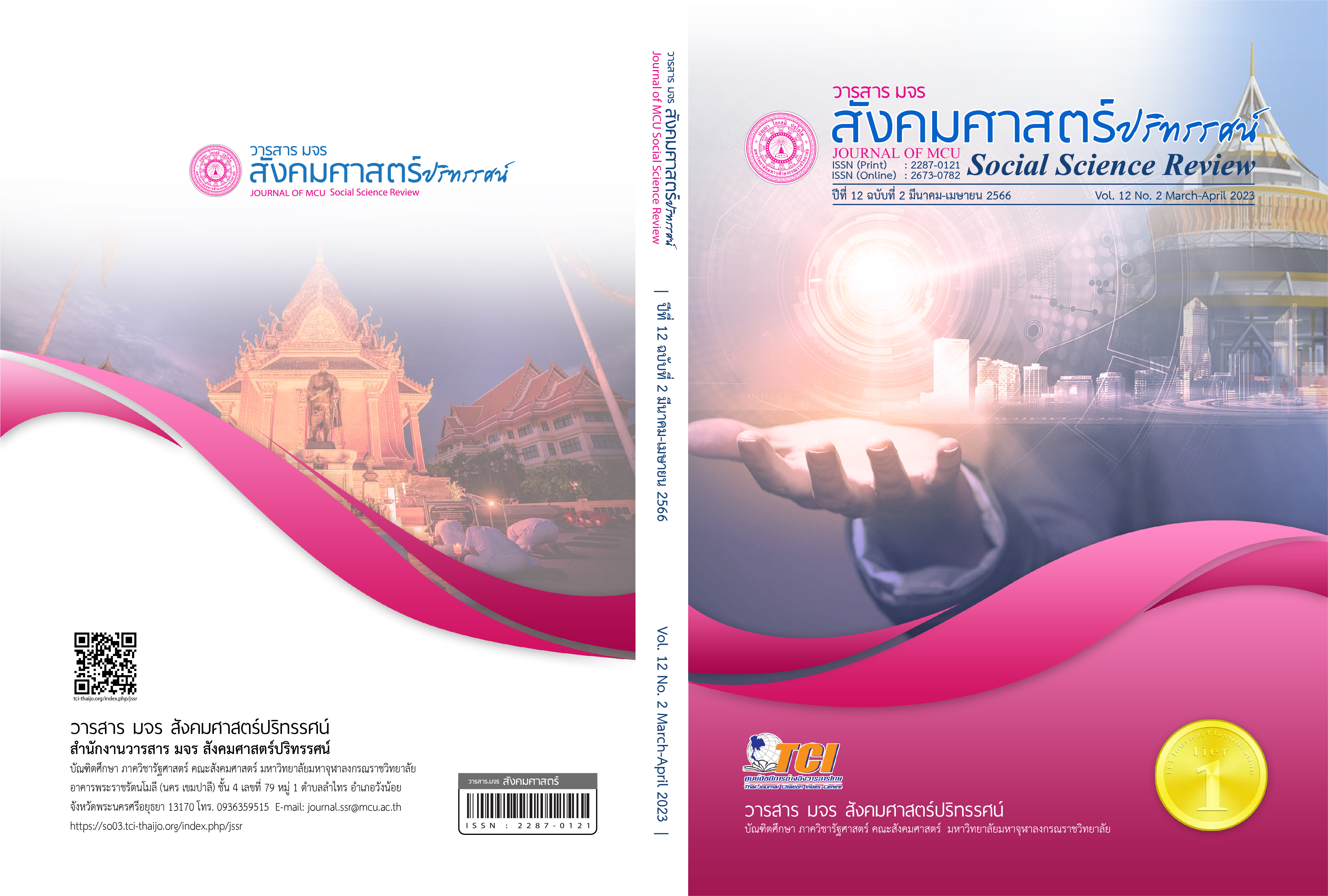โปรแกรมออนไลน์เพื่อเสริมพลังทักษะการแก้ปัญหาของนักเรียน โดยหลักการ ทางทฤษฎีและหลักคำสอนทางพระพุทธศาสนา ในสถานศึกษาเอกชน สังกัดสำนักงานคณะกรรมการส่งเสริมการศึกษาเอกชน
คำสำคัญ:
ทักษะการแก้ปัญหา, หลักคำสอน , พระพุทธศาสนาบทคัดย่อ
บทความวิจัยนี้ มีวัตถุประสงค์เพื่อ วิจัยและพัฒนาโปรแกรมออนไลน์เพื่อเสริมพลังทักษะการแก้ปัญหาของนักเรียน ในสถานศึกษาเอกชน 3 ประเด็น คือ 1) เพื่อพัฒนาโปรแกรมออนไลน์ตามแนวคิด “Knowledge + Action = Power” 2) เพื่อประเมินประสิทธิผลของโปรแกรมออนไลน์ และ 3) เพื่อถอดบทเรียนให้ทราบถึงข้อเสนอแนะเพื่อการปรับปรุงแก้ไขโปรแกรมออนไลน์ ประกอบด้วย 2 โครงการ คือ พัฒนาความรู้ครูผู้สอน มี 3 ชุด และนำความรู้สู่การพัฒนานักเรียน มี 1 ชุด ใช้ระเบียบวิธีวิจัยและพัฒนา มีผู้ร่วมวิจัย ครู 16 คน และนักเรียน 197 คน ในโรงเรียนสุดารัตน์วิทยาคม
ผลการวิจัยพบว่า 1) คู่มือประกอบโครงการโปรแกรมออนไลน์ ตามเกณฑ์มาตรฐาน 90/90 ดังนี้ (1) กรณี 90 ตัวแรก พบว่า คะแนนเฉลี่ยจากแบบทดสอบวัดผลการเรียนรู้หลังเสร็จสิ้นการเรียนรู้ตามโปรแกรมของกลุ่มทดลองคิดเป็นร้อยละ 95.40 แสดงว่า เนื้อหาในคู่มือประกอบโครงการแต่ละชุดมีประสิทธิภาพที่สามารถนำไปใช้พัฒนาครูให้เกิดการเรียนรู้ได้ตามเกณฑ์ที่กำหนด (2) กรณี 90 ตัวหลัง พบว่า กลุ่มทดลองทำข้อสอบในแบบทดสอบผลการเรียนรู้ทุกวัตถุประสงค์การเรียนรู้ร้อยละ 25.00 แสดงว่า คู่มือประกอบโครงการ ยังมีข้อบกพร่องที่ควรหาทางปรับปรุงแก้ไขอยู่ ซึ่งอาจเนื่องจากการใช้สำนวนภาษาที่คลุมเครือไม่ชัดเจน 2) แบบประเมินทักษะการแก้ปัญหาของนักเรียนที่เป็นกลุ่มทดลองหลังครูผู้สอนนำความรู้สู่การพัฒนาผู้เรียนเสร็จแล้ว (Post-test) พบว่า มีค่าเฉลี่ยเท่ากับ 71.21 ซึ่งเมื่อนำไปวิเคราะห์เปรียบเทียบความแตกต่างกับผลการประเมินก่อนเรียน (Pre-test) ซึ่งมีค่าเฉลี่ยเท่ากับ 20.40 พบว่า นักเรียนที่เป็นกลุ่มตัวอย่างในการทดลองได้คะแนนจากการทดสอบหลังเรียนสูงกว่าก่อนเรียนอย่างมีนัยสำคัญทางสถิติที่ระดับ .05
เอกสารอ้างอิง
กมล รอดคล้าย. (2560). แผนการศึกษาแห่งชาติ พ.ศ. 2560-2579. สืบค้น 31 สิงหาคม 2562, จาก https://bit.ly/2YIO7EY.
ชัยวัฒน์ สุทธิรัตน์. (2558). 80 นวัตกรรมการจัดการเรียนรู้ที่เน้นผู้เรียนเป็นสำคัญ. นนทบุรี: พี บาลานซ์ ดีไซด์แอนปริ้นติ้ง.
ณรงค์ พิพัฒนาศัย. (2557). นโยบายรัฐมนตรีว่าการกระทรวงศึกษาธิการ ประจำปีงบประมาณ 2558 5 นโยบายทั่วไป 7 นโยบายเฉพาะ และ 10 นโยบายเร่งด่วน. สืบค้น 7 กันยายน 2562, จาก https://bit.ly/3f6yf3H.
ดุษฎี โยเหลา และคณะ. (2557). การจัดการเรียนรู้แบบใช้โครงงานเป็นฐาน (Project-Based Learning). สืบค้น 31 สิงหาคม 2562, จาก candmbsri.wordpress.com/2015.
ธันยวิช วิเชียรพันธ์ และปวีณา จันทร์สุข. (2556). รายงานโครงการพัฒนาเครื่องมือเพื่อเสริมสร้างทักษะแห่งศตวรรษที่ 21 ของเด็กและเยาวชนไทย เพื่อเตรียมความพร้อมสู่ประชาคมอาเซียน. สืบค้น 27 มีนาคม 2559, จาก https://bit.ly/2ceCSde.
พระธรรมปิฎก (ป.อ. ปยุตโต). (2542). การศึกษากับการพัฒนาทรัพยากรมนุษย์ (พิมพ์ครั้งที่ 2). กรุงเทพฯ: มูลนิธิพุทธธรรม.
พระพรหมคุณาภรณ์ (ป.อ. ปยุตฺโต). (2546). ฆราวาสธรรม 4, พจนานุกรมพุทธศาสตร์ ฉบับประมวลธรรม (พิมพ์ครั้งที่ 12). สืบค้น 9 มิถุนายน 2563, จาก https://bit.ly/2MLnLdU.
พระพรหมคุณาภรณ์ (ป.อ.ปยุตฺโต). (2556). พจนานุกรมพุทธศาสตร์ฉบับประมวลธรรม. กรุงเทพฯ: เอส.อาร์ พริ้นติ้งแมสโปรดักส์.
พระมหาสมควร ศรีสงคราม. (2550). การศึกษาความสัมพันธ์ระหว่างสัปปุริสธรรมและพละธรรมกับการปฏิบัติงานของผู้บริหารสถานศึกษา กลุ่มเขตกรุงธนบุรีใต้ สังกัดกรุงเทพมหานคร (วิทยานิพนธ์ปริญญาการศึกษามหาบัณฑิต). กรุงเทพฯ: มหาวิทยาลัยศรีนครินทรวิโรฒ.
พระเมธีวชิโรดม (ว.วชิรเมธี). (2561). พุทธธรรม 4.0 ศาสนากับความท้าทายทางเทคโนโลยี. สืบค้น 8 กันยายน 2562, จาก https://bit.ly/37eHQmo.
พิมพ์พันธ์ เดชะคุปต์ และพเยาว์ ยินดีสุข. (2556). ทักษะ 5C เพื่อการพัฒนาหน่วยการเรียนรู้และการจัดการเรียนการสอนอิงมาตรฐาน. กรุงเทพฯ: โรงพิมพ์แห่งจุฬาลงกรณ์มหาวิทยาลัย.
______. (2557). การจัดการเรียนรู้ในศตวรรษที่ 21. กรุงเทพฯ: โรงพิมพ์จุฬาลงกรณ์มหาวิทยาลัย.
พุทธทาสภิกขุ. (2528). ศึกษาธรรมะอย่างถูกวิธี หรือ ธรรมวิภาคนวกภูมิ (พิมพ์ครั้งที่ 5).กรุงเทพฯ: พุทธศาสน์.
ราชบัณฑิตยสถาน. (2548). อริยสัจ 4, พจนานุกรมศัพท์ศาสนาสากล ฉบับราชบัณฑิตยสถาน. (พิมพ์ครั้งที่ 2 แก้ไขเพิ่มเติม). กรุงเทพฯ: อรุณการพิมพ์.
วาสนา ภูมี. (2555). ผลของการจัดการเรียนรู้โดยใช้ปัญหาเป็นฐาน เรื่อง อัตราส่วนและร้อยละที่มีต่อความสามารถในการแก้ปัญหาทางคณิตศาสตร์และความาสามรถในการให้เหตุผลทางคณิตศาสตร์ของนักเรียนชั้นมัธยมศึกษาปี ที่ 2 (วิทยานิพนธ์ปริญญาศึกษาศาสตร์ มหาบัณฑิต). กรุงเทพฯ: มหาวิทยาลัยศรีนครินทรวิโรจน์.
วิจารณ์ พานิช. (2555). วิถีการสร้างการเรียนรู้เพื่อศิษย์ในศตวรรษที่ 21. กรุงเทพฯ: มูลนิธิสดศรีสฤษดิ์วงศ์.
วิโรจน์ สารรัตนะ (2561). การวิจัยทางการบริหารการศึกษา : แนวคิด แนวปฏิบัติและกรณีศึกษา. E-Book (พิมพ์ครั้งที่ 4). กรุงเทพฯ: หจก. ทิพยวิสุทธิ์.
______. (2558) การวิจัยทางการบริหารการศึกษา: แนวคิด แนวปฏิบัติ และกรณีศึกษา (พิมพ์ครั้งที่ 4). กรุงเทพฯ: สำนักพิมพ์ซีเอ็ดบุ๊คเซ็นเตอร์.
ศิริวรรณ ฉัตรมณีรุ่งเจริญ และวรางคณา ทองนพคุณ. (2556). ทักษะแห่งศตวรรษที่ 21 ความท้าทายในอนาคต 21st Century Skills : The Challenges Ahead. ภูเก็ต:มหาวิทยาลัยราชภัฏภูเก็ต.
สมคิด พรมจุ้ย และสุพักตร พิบูลย์. (2552). การพัฒนาหลักสูตรฝึกอบรมทางไกลเรื่องการวิจัย และพัฒนางานวิชาการ. นนทบุรี: มหาวิทยาลัยสุโขทัยธรรมธิราช.
สุปรียา ศิริพัฒนกุลขจร. (2555). การพัฒนารูปแบบการสอนโดยใช้ห้องเรียนเสมือนจริงแบบใช้ปัญหาเป็นหลักในระดับอุดมศึกษา (ดุษฎีนิพนธ์ สาขาการบริหารการศึกษา). กรุงเทพฯ: มหาวิทยาลัยศรีนครินทรวิโรฒ.
สุรวุฒิ ยัญญลักษณ์. (2550). การพัฒนาสมรรถนะเพื่อเพิ่มประสิทธิผลในองค์กรข้าราชการครูและบุคลากรทางการศึกษาในสถานศึกษาขั้นพื้นฐาน (วิทยานิพนธ์ สาขาวิชาการบริหารการศึกษา) กรุงเทพฯ: มหาวิทยาลัยเกษตรศาสตร์.
อนงค์ สินธุศิริ. (2555). การเรียนรู้แนวใหม่ในศตวรรษที่ 21. สืบค้น 31 สิงหาคม 2562, จาก https://bit.ly/2oboAnv.
อาริยา ธีรธวัช. (2560). การวิจัยเชิงปฏิบัติการแบบมีส่วนร่วมเพื่อพัฒนาทักษะศตวรรษที่ 21 สำหรับครู ในวิทยาลัยเทคโนโลยีคุวานันท์ (ดุษฎีนิพนธ์ สาขาวิชาการบริหารการศึกษา) นครปฐม: มหาวิทยาลัยมหามกุฏราชวิทยาลัย.
Abazov, R. (2016). Problem-Solving Skills Improvement Methods. Retrieved August 29, 2019, from https://bit.ly/2Le5tmp.
Admin, Con. (2018). Problem Effectiveness in a Course Using Problem-Based Learning: Academic Problem-Solving Steps: Process & Strategies for Success. Doctor of Philosophy Thesis. The George Washington University. Retrieved May 12, 2019, from https://bit.ly/2GUlQBa.
Attri, RK. (2018). Six Guidelines for Developing Training of Acquiring Complex Problem-Solving Skills. Retrieved August 29, 2019, from https://bit.ly/2nuW
Balingcasag, H. (2018). Development of Problem-Solving. Retrieved May 12, 2019, from https://bit.ly/30BnDUq.
Cherry, K. (2018). Overview of the Problem-Solving Mental Process. Retrieved August 29, 2019, from https://bit.ly/2Hqsc9I.
Dave, D. (2018), Strategies for enhancing your problem-solving skills. Retrieved August 29, 2019, from https://bit.ly/2YRfOHH.
Dhanani, S. (2019). The Importance of Problem Solving as a skill. Retrieved May 12, 2019, from https://bit.ly/2nlxChJ.
Eder, F, Eichelberger, H., & Friedrich, M. X. (2010). Child-Centered Education [Online]. Retrieved May 12, 2019, from http://www.koeck-stiftung.at/
Erkic, A. (2017). Having Excellent Problem-Solving Skills Can Make More Successful: The Steps You Should Follow. Retrieved May 12, 2019.
Foshay, R., & Kirkley, J. (1998). Principles for Teaching Problem Solving. Retrieved May 12, 2019, from https://bit.ly/2yMuWvk.
Guzdial, M. (1998). Technological Support for Project-Based Learning. ASCD Yearbook: Learning with Technology, 14: 47-71.
Halloran, J. (2016). A Simple 5-Step Process for Problem Solving. Retrieved August 29, 2019, from https://bit.ly/2kuKiRQ.
Hao, T. (2017). Four Strategies Problem Solving Improvement – Prototype. Retrieved May 12, 2019, from https://bit.ly/2ZIv1fr.
Hicks, T. (n.d.). Seven Steps for Effective Problem Solving in Workplace. Retrieved August 29, 2019, from https://bit.ly/2o9XM6Z.
Hill, A. (2016). Six Awesome Ways for Enhancing Problem-Solving Skills. Retrieved May 12, 2019, from https://bit.ly/2UsE8j1.
Johansson, A. (2017). Eight Strategies for Group Problem Solving and Creativity. Retrieved May 12, 2019, from https://bit.ly/2p1TEXa.
Kova. (n.d.) Seven Ways for Problem Solving. Retrieved August 29, 2019, from ttps://bit.ly/2KAocqa.
Lewis, F. (2017). Five Ways on Problem-Solving Skills Enhancement (Guest Post). Retrieved August 29, 2019, from https://bit.ly/2YT7c3B.
Lewis, M. (2018). Five-Step Problem Solving Processes & Strategies for Success. Retrieved August 29, 2019, from https://bit.ly/2nz9oAm.
ดาวน์โหลด
เผยแพร่แล้ว
รูปแบบการอ้างอิง
ฉบับ
ประเภทบทความ
สัญญาอนุญาต
ลิขสิทธิ์ (c) 2023 วารสาร มจร สังคมศาสตร์ปริทรรศน์

อนุญาตภายใต้เงื่อนไข Creative Commons Attribution-NonCommercial-NoDerivatives 4.0 International License.
เพื่อให้เป็นไปตามกฎหมายลิขสิทธิ์ ผู้นิพนธ์ทุกท่านต้องลงลายมือชื่อในแบบฟอร์มใบมอบลิขสิทธิ์บทความให้แก่วารสารฯ พร้อมกับบทความต้นฉบับที่ได้แก้ไขครั้งสุดท้าย นอกจากนี้ ผู้นิพนธ์ทุกท่านต้องยืนยันว่าบทความต้นฉบับที่ส่งมาตีพิมพ์นั้น ได้ส่งมาตีพิมพ์เฉพาะในวารสาร มจร สังคมศาสตร์ปริทรรศน์ เพียงแห่งเดียวเท่านั้น หากมีการใช้ภาพหรือตารางหรือเนื้อหาอื่นๆ ของผู้นิพนธ์อื่นที่ปรากฏในสิ่งตีพิมพ์อื่นมาแล้ว ผู้นิพนธ์ต้องขออนุญาตเจ้าของลิขสิทธิ์ก่อน พร้อมทั้งแสดงหนังสือที่ได้รับการยินยอมต่อบรรณาธิการ ก่อนที่บทความจะได้รับการตีพิมพ์ หากไม่เป็นไปตามข้อกำหนดเบื้องต้น ทางวารสารจะถอดบทความของท่านออกโดยไม่มีข้อยกเว้นใดๆ ทั้งสิ้น





